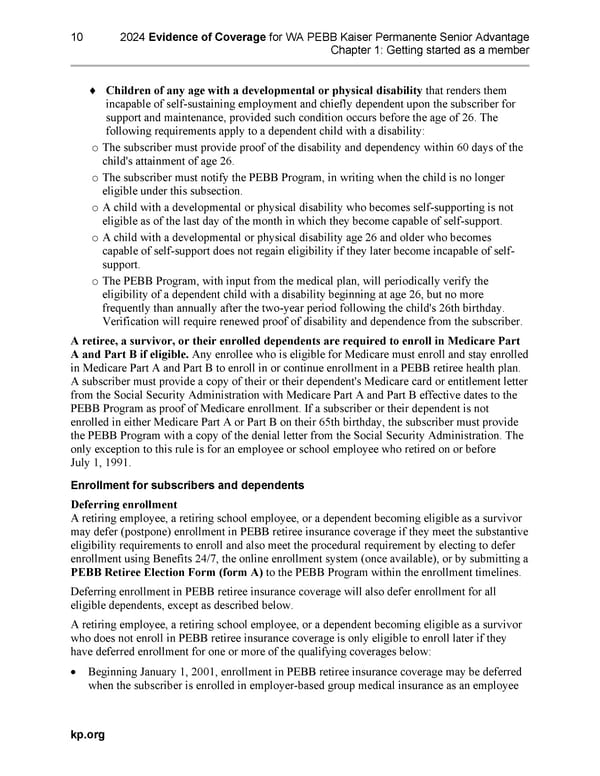10 2024 Evidence of Coverage for WA PEBB Kaiser Permanente Senior Advantage Chapter 1: Getting started as a member ♦ Children of any age with a developmental or physical disability that renders them incapable of self-sustaining employment and chiefly dependent upon the subscriber for support and maintenance, provided such condition occurs before the age of 26. The following requirements apply to a dependent child with a disability: o The subscriber must provide proof of the disability and dependency within 60 days of the child's attainment of age 26. o The subscriber must notify the PEBB Program, in writing when the child is no longer eligible under this subsection. o A child with a developmental or physical disability who becomes self-supporting is not eligible as of the last day of the month in which they become capable of self-support. o A child with a developmental or physical disability age 26 and older who becomes capable of self-support does not regain eligibility if they later become incapable of self- support. o The PEBB Program, with input from the medical plan, will periodically verify the eligibility of a dependent child with a disability beginning at age 26, but no more frequently than annually after the two-year period following the child's 26th birthday. Verification will require renewed proof of disability and dependence from the subscriber. A retiree, a survivor, or their enrolled dependents are required to enroll in Medicare Part A and Part B if eligible. Any enrollee who is eligible for Medicare must enroll and stay enrolled in Medicare Part A and Part B to enroll in or continue enrollment in a PEBB retiree health plan. A subscriber must provide a copy of their or their dependent's Medicare card or entitlement letter from the Social Security Administration with Medicare Part A and Part B effective dates to the PEBB Program as proof of Medicare enrollment. If a subscriber or their dependent is not enrolled in either Medicare Part A or Part B on their 65th birthday, the subscriber must provide the PEBB Program with a copy of the denial letter from the Social Security Administration. The only exception to this rule is for an employee or school employee who retired on or before July 1, 1991. Enrollment for subscribers and dependents Deferring enrollment A retiring employee, a retiring school employee, or a dependent becoming eligible as a survivor may defer (postpone) enrollment in PEBB retiree insurance coverage if they meet the substantive eligibility requirements to enroll and also meet the procedural requirement by electing to defer enrollment using Benefits 24/7, the online enrollment system (once available), or by submitting a PEBB Retiree Election Form (form A) to the PEBB Program within the enrollment timelines. Deferring enrollment in PEBB retiree insurance coverage will also defer enrollment for all eligible dependents, except as described below. A retiring employee, a retiring school employee, or a dependent becoming eligible as a survivor who does not enroll in PEBB retiree insurance coverage is only eligible to enroll later if they have deferred enrollment for one or more of the qualifying coverages below: • Beginning January 1, 2001, enrollment in PEBB retiree insurance coverage may be deferred when the subscriber is enrolled in employer-based group medical insurance as an employee kp.org
 Kaiser Permanente NW Senior Advantage EOC (2024) Page 47 Page 49
Kaiser Permanente NW Senior Advantage EOC (2024) Page 47 Page 49